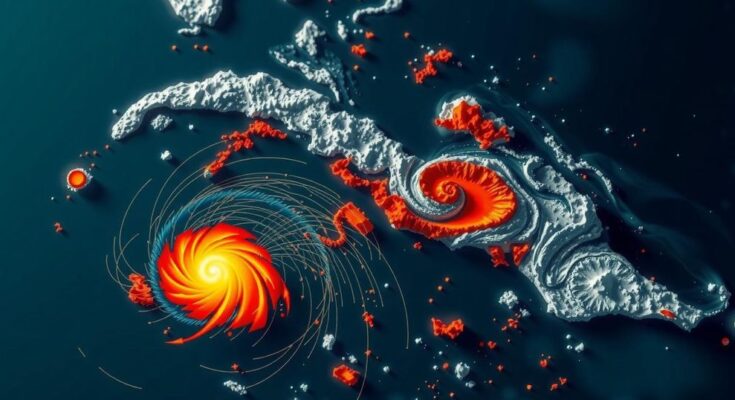A 6.8 magnitude earthquake struck eastern Cuba on Sunday after a series of hurricanes and blackouts affected the island. No immediate injuries or damages were reported, but residents expressed fear and uncertainty. The tremor follows Hurricane Rafael, which caused widespread destruction and power outages in the region, worsening the ongoing energy crisis and prompting small protests among the populace.
A powerful earthquake measuring 6.8 on the Richter scale struck eastern Cuba on Sunday, occurring in the aftermath of severe hurricanes and widespread blackouts that have afflicted the nation in recent weeks. The United States Geological Survey reported that the epicenter was located approximately 25 miles (40 km) south of Bartolome Maso, with vibrations felt in major cities, including Santiago de Cuba. Fortunately, there have been no immediate reports of injuries or structural damage, despite residents expressing their fear and surprise at the seismic event. For instance, an elderly resident, Yolanda Tabio, described the intense shaking, stating that it caused many to flee to the streets and anxiously remain at their doorways, feeling aftershocks that followed the initial quake. This earthquake follows a particularly challenging time for the people of Cuba. Just a few days before, Hurricane Rafael, categorized as a 3 hurricane, ravaged western Cuba with fierce winds, causing widespread power outages and damaging numerous homes. Residents were left without electricity for days as neighborhoods and communities dealt with continuous blackouts stemming from the island’s ongoing energy crisis. Additionally, a prior hurricane in October resulted in substantial loss of life and further devastation, escalating public unrest and prompting minor protests across the island as citizens struggle with essential services and living conditions.
Cuba has recently endured a series of natural disasters, compounded by an ongoing energy crisis leading to extensive blackouts. The earthquakes have added to the existing hardships, as the population grapples with the effects of hurricanes and infrastructural challenges. The series of events highlights the vulnerabilities Cuba faces, both from climatic threats and systemic failures concerning energy provision and emergency response. These crises not only affect physical safety but also contribute to rising tensions and dissatisfaction among the populace, as seen in the minor protests that have emerged across the nation.
In summary, the 6.8 magnitude earthquake that impacted eastern Cuba marks another severe challenge for a nation already buffeted by hurricanes and energy blackouts. Although the immediate effects appear limited concerning injuries and damage, the psychological toll on residents is profound, particularly in the wake of widespread devastation from recent hurricanes. This sequence of natural disasters underscores the critical need for effective infrastructure and disaster readiness in Cuba as its citizens continue to face escalating hardships.
Original Source: torontosun.com




